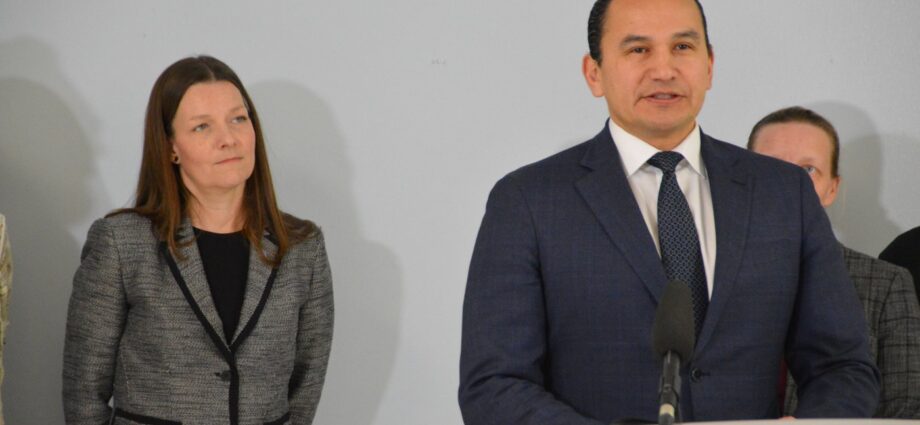
By Dave Baxter, Local Journalism Initiative Reporter, Winnipeg Sun
February 17, 2024
Applause erupted in a rural Manitoba community centre on Friday when the premier and the environment minister announced they are putting the axe to a sand mine project that has been at the centre of heated controversy in a small Manitoba community.
“Today we are saying no to Sio,” Manitoba Premier Wab Kinew said at a media conference held at the Anola Community Centre in the RM of Springfield Friday morning.
“Sio Silica will not be able to mine silica sand in this region, they will not be able to drill into the aquifers, and Manitoba families can rest easy knowing that your drinking water will stay pristine.”
Kinew’s announcement Friday morning led to an extended round of applause among many of the Springfield residents who gathered at the community centre and got the news that many of them had been hoping to hear.
Plans had been in the works for about four years for Calgary-based Sio Silica to build a silica mine and processing plant near Vivian east of Winnipeg. The project called for up to 7,700 wells over 24 years to extract ultra-pure silica sand, which can be used in the production of solar panels, batteries, and semiconductors.
But those plans weren’t welcomed by many who live in Springfield, as residents and some local politicians have said the methods the mine would have used to extract sand could pose a serious risk to aquifers that provide drinking water to approximately 100,000 Manitobans.
Kinew said that after a lengthy review of a Clean Environment Commission (CEC) report that was released last year, the province agreed that allowing the project to move forward would be something that would pose far too many “risks and unknowns.”
“We reviewed the CEC report, we spoke with department experts, we listened to the concerns of the community and after careful consideration we said no to Sio,” Kinew said.
Kinew added, “The business case does not outweigh the serious environmental risks that this project poses.”
Environment and Climate Change Minister Tracy Schmidt, who also spoke at Friday’s announcement, echoed Kinew’s comments that there were too many risks involved in the way that the company wanted to mine for silica sand in the region.
“This is a novel and unproven method that the proponent is proposing,” she said. “No one knows what the long-term effects of this proposal would be, and worst-case-scenario, it could be absolutely disastrous for the people who rely on these aquifers.
“This decision comes after months of careful review by our government, our departments and the CEC, and all of them have identified serious concerns and unknowns about this project.”
Long-time Springfield resident Darryl Speers has been one of many Springfield residents who have been in opposition to the project for more than a year, and he has attended several rallies to voice opposition to the mine in the past few months.
He said Friday’s announcement was a relief, but also an “affirmation” that the concerns of Springfield residents were legitimate.
“We feel affirmed now, because sometimes when you stand up like this you get accused of fear-mongering, but this was not fearmongering,” Speers said.
“I have been doing research, as have many others since this was first announced, and I know that Sio Silica has never proven without any doubt that this is safe.”
Springfield councillors Andy Kuczynski and Mark Miller have been at the forefront of a months-long campaign opposing the mine, and Kuczynski said Friday he believes the NDP has made the right decision to kill the project.
“It’s a good day for the community,” Kuczynski said.
He added he believes the ongoing opposition to the project over many months from Springfield residents and from him and Miller opened up a larger conversation that made more Manitobans aware of the potential risks that the mine posed.
“Yes I think we brought it out into the open, but that’s what we were voted in to do,” Kuczynski said. “The majority of residents didn’t want this, and we have a mandate to work for the people, so we could not just be silent on this.”
In a statement released Friday, Sio Silica called the decision a “loss” for Manitoba, and disputed the province’s assertions that the methods they would have used for extraction have not been proven to be safe.
“The Sio Silica project is not unsafe or unproven, the safety and feasibility to proceed has been confirmed by some of the largest global engineering firms and respected independent experts,” the company said. “This is a huge loss for Manitoba and for Canada as a whole.”
Sio Silica added they will evaluate its legal options now that the environmental license has been denied.
“Sio remains hopeful that the government will be open to discussing solutions that are grounded in science, and does not squander this multi-generational opportunity for the people of Manitoba,” they said.
“Sio will take the coming weeks to evaluate its legal options in the face of the minister’s decision today.”
Subscribe to our newsletter.
— Dave Baxter is a Local Journalism Initiative reporter who works out of the Winnipeg Sun. The Local Journalism Initiative is funded by the Government of Canada.


